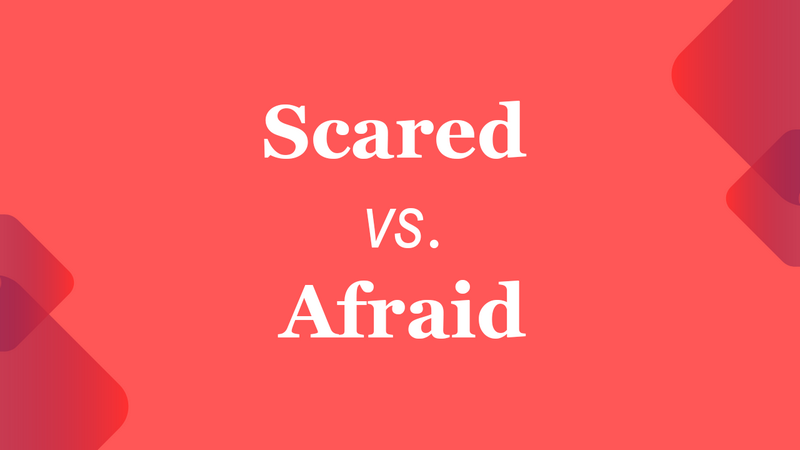“Are you scared of spiders?” or “Are you afraid of spiders?” In this situation, “scared” and “afraid” mean the same thing. However, there are also situations in which they do not mean the same thing. In this post, we are talking about how to use the words “scared” and “afraid.”
Scared and Afraid as Adjectives
Both of these words are adjectives, and they usually mean that someone or something is experiencing fear, the feeling that something bad, dangerous, or painful is going to happen.
So, “I’m scared of spiders” and “I’m afraid of spiders” both mean that spiders cause me to experience fear.
Some other things that many people are afraid of are snakes, ghosts, the dark, flying, dying, and going to the dentist. So, again, when we talk about our feelings towards those things, “scared” and “afraid” mean the same thing.
Because “scared” and “afraid” are both adjectives, we usually use them with the verb “to be”:
- I am scared.
- She is not scared.
- We were afraid.
Using Scared/Afraid + Preposition
You’ve probably noticed by now that when we mention the thing that causes us to experience fear, we use the word “of”:
- She is afraid of rats.
But we can also use “scared” or “afraid” to do something. This means that you do not want to do something because you think that something bad will happen. For example:
- He’s afraid to ask her out on a date.
- She’s scared to tell her mother the truth.
scared/afraid + to + verb
Differences Between Scared and Afraid
Now, let’s talk about how these words are different. In the previous examples, we used “scared” and “afraid” as adjectives. And “afraid” is always an adjective; it can never be a noun or a verb. However, “scared” is both an adjective and the past tense form of the verb “scare.”
To scare someone means to make them feel scared. For example:
- Ghosts scare me.
That means the same thing as “I am scared of ghosts.” The difference is just that “Ghosts scare me” uses the verb “scare,” and “I am scared of ghosts” uses the adjective “scared.”
So, using the past tense, we can say things like “You scared me,” which means “You made me feel scared.” And “scared” is also the third form of the verb “scare,” so we can use it not only in past tense but also in perfect tenses and in passive voice:
- My dog has scared many people. (That’s an example of present perfect tense)
- She was scared by the loud noise. (That’s an example of passive voice)
If you’re now wondering about the difference between “scared of” and “scared by,” the main difference is that “scared of” is more about your imagination. Something might or might not be real, but the idea scares you. For example, you can be scared of ghosts even if you have never seen a ghost. But if you were scared by a ghost, that means that you saw one specific ghost, and it scared you.
So those are some of the ways that we use “scared” but not “afraid.”
Unique Uses of Afraid
We’re now going to look at one way that we use “afraid” but not “scared.” This is when we are giving bad news or maybe disagreeing with someone, and it doesn’t mean that you are really afraid; it’s just a polite way of saying, “I know that this is bad news” or “I know that people are not going to be happy about this.”
If your doctor says, “I’m afraid that I have some bad news,” that does not mean that they are afraid of something; it’s just a polite way of saying, “I’m sorry that I have to tell you something bad.”
Or you could tell your friend, “I’m afraid that I have to cancel our plans.” That’s just a polite way of saying, “I’m sorry; I know that this is not a good situation.” So, in those situations, you can only use “afraid.” You cannot use “scared.”
Word Order with Scared vs. Afraid
One final difference between “scared” and “afraid” is that you cannot put “afraid” directly before a noun:
✅ I saw a scared child.
❌ I saw an afraid child.

